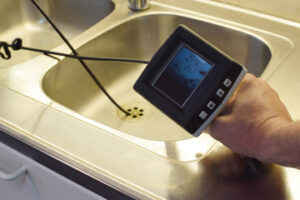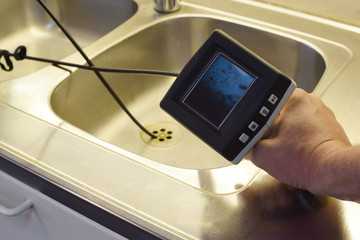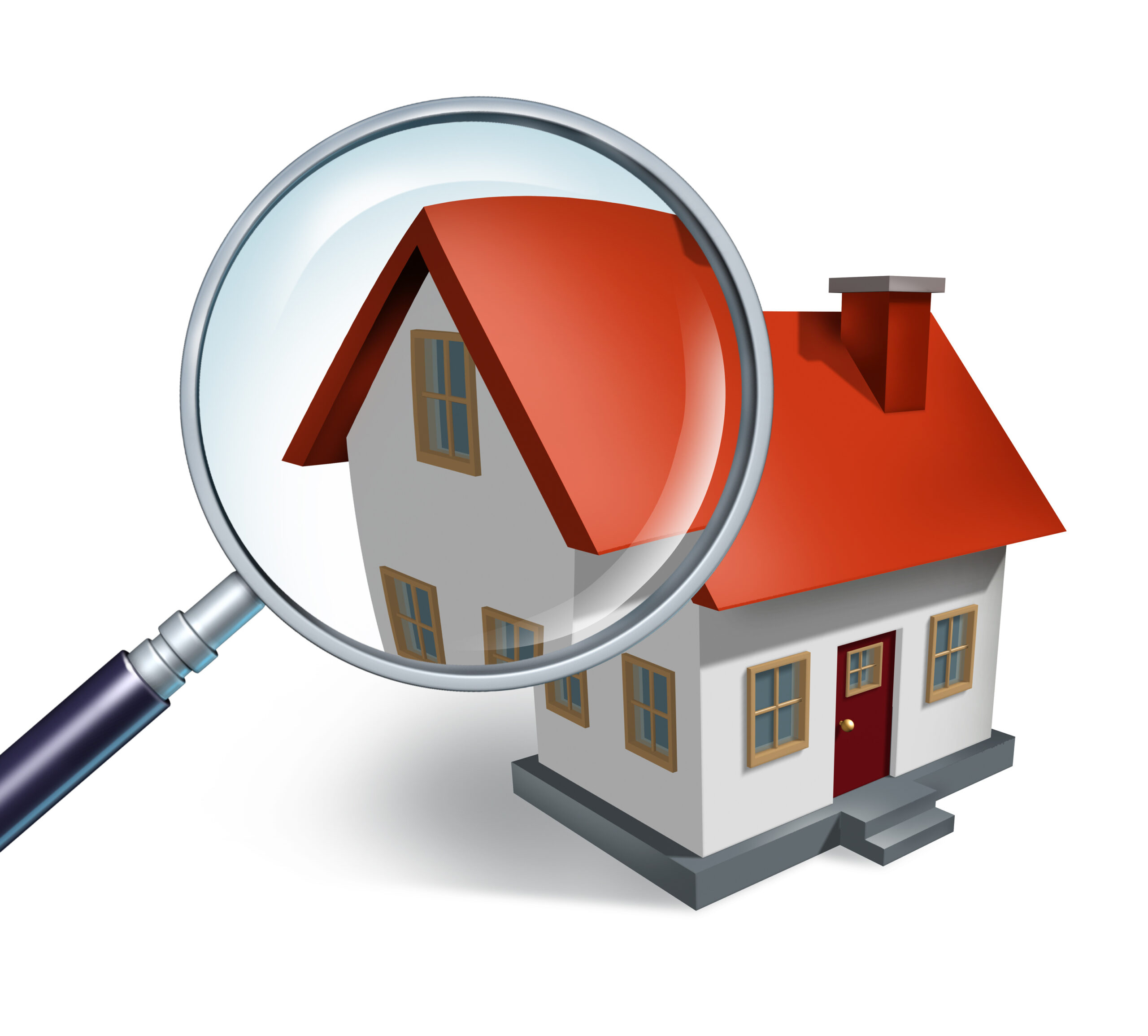A sewer scope is a small camera on the end of a long cable that gets inserted into your home’s plumbing line to check for damage, signs of trouble down the road and more. A home inspector will run this test as part of a comprehensive home inspection or separately as an add-on service.

Sewer lines aren’t something you can easily see, so a home inspector must use specialized equipment to check for problems. A standard Sewer Scope Inspection takes just one hour and can be added to a home inspection, or scheduled as a separate service. Adding a sewer scope inspection to a home purchase gives a complete picture of the condition of the waste lines, making it easier for buyers to make an informed decision about their new home.
A trained professional will begin the inspection by setting up an access point, double checking the location for leaks, and putting down drop cloths as needed. Then, they’ll push a long cable with a camera attached to its end down the drain and all the way into your home’s sewage line connection to the septic tank or city sewer line. The video produced is recorded and can be reviewed afterward to look for signs of blockages, damage, or poor installation.
Some common symptoms of a faulty sewage line include a foul odor, damp and soggy lawns above the sewage line, and backflow in your home. While these signs aren’t definitive, they can be a good indication that the lateral sewer line is damaged. Once the inspector has a clear picture of your sewage lines, they can recommend next steps and suggest contractors that may be able to help.
In many cases, the simplest solution is to replace the damaged line. However, this can be very expensive and must be done in a timely manner to avoid further damage or contamination. A faulty sewer line can also cause other costly problems, such as water or sewage backing up into your house, so regular scope inspections are essential for home maintenance.
Even if your home’s pipes are in excellent shape, it’s always a good idea to add a sewer scope inspection to any home sale. Shifting ground, tree roots, and other environmental factors can cause damage to sewer lines over time, so it’s best to catch a problem before it becomes worse. If you’re selling your home, getting a scope inspection can give you peace of mind and help you get top dollar for your property.
Equipment
Sewer line problems can be expensive, especially if they’re left unchecked. That’s why sewer scope inspections are an important part of the home buying process. If you’re in the business of home inspections, adding this ancillary service to your offerings can help you generate more revenue and keep your clients happy.
A home inspector uses a special camera to view and record the inside of a sewer pipe. This enables them to spot issues that wouldn’t be visible to the naked eye. Then they can recommend repairs to the homeowner or seller and help them avoid costly future problems.
The equipment used for a sewer scope inspection is relatively inexpensive and easy to transport. It consists of a small video camera with a long cable and a portable control unit. The inspector inserts the camera into the sewage line, also known as a lateral, through the cleanout at the house. Then the camera travels down the lateral until it reaches the main sewer line, typically located under the street. The camera can detect issues like broken pipes, offset joints, root intrusions and clogs. The inspector then notes the locations of these problems for future reference.
Having the right equipment is crucial for success in the sewer scope inspection business. The inspector needs to have a good-quality camera that’s durable and can be maneuvered easily through the pipes. They also need a portable control unit that’s reliable and can handle the rigors of daily use. The units also need to be easy to carry and set up.
Another key to success is having the right training and experience to operate the equipment safely and accurately. Home inspectors who have been trained in the use of sewer scopes can spot potential problems that aren’t readily apparent to the untrained eye. This allows them to make recommendations to the home seller that can potentially save them thousands of dollars in repair costs.
It’s a good idea for all home buyers to get a sewer scope inspection before making an offer on a property. This is because the expense of repairing or replacing a damaged sewer line can run into the tens of thousands of dollars. In addition, older homes may have pipes made of clay or tar paper that are prone to cracking and breaking.
Training
During a sewer scope inspection, a home inspector inserts a plumbing camera attached to a snake-like cable into a house’s drainpipe and streams live video on a monitor. This allows the inspector to look for blockages, damage to the pipes and other serious problems that can’t be seen with the naked eye.
A damaged sewer line can cause serious health and structural damage to a home. This is why it’s essential for homeowners, buyers and sellers to have routine inspections done to spot issues before they become costly repairs or emergencies.
Once you’ve completed the course, you’ll be ready to begin offering this valuable ancillary service to your clients. To start, you’ll need to invest in a quality camera system. They aren’t cheap, but you can write off the cost as a business expense. The next step is to decide if you’ll offer this service as part of your home inspection package or as an add-on.
After establishing an access point and checking for leaks, your inspector will place dropcloths before pushing the camera scope into the drainpipe. The inspector will then carefully observe the results on a large monitor. This is where they’ll be able to spot any potential problems, such as tree roots blocking the pipe or misaligned joints.
Other common problems spotted during a sewer scope inspection include sagging pipes due to ground shifting and the deterioration of older clay pipes. These pipes often have to be replaced with PVC, which is more durable and less prone to cracking and leaks.
Once the inspection is complete, your inspector will provide a written report that outlines the findings and offers suggestions for next steps. A reputable home inspector will be able to explain the problem and recommend a solution in an easy-to-understand way. This will allow homeowners, buyers and sellers to act quickly to prevent costly repairs or disasters.
Insurance
Depending on how you structure your business, there are several options for sewer scope insurance coverage. One option is for home inspectors to purchase a commercial general liability policy that includes coverage for their work. Another option is for home inspectors to purchase specialized professional liability coverage for their sewer scope inspection work.
As a home buyer, you should always have a sewer scope inspection done before purchasing a new home. This is important to identify any potential problems that may not show up on a standard home inspection, including severe damage or serious blockages. You also want to have a clear idea of the condition of your sewage system so you can request the appropriate repairs before they become an expensive and dangerous issue.
A sewer scope inspection uses a snake-like cable to examine your home’s sewage line. These privately-owned pipes lead from your home to the city sewer main or septic tank, and can reveal problems like cracks, root infiltration, or clogs. Your home inspector will provide a thorough report after the inspection that can be used to request necessary repairs before they become an emergency.
If you’re a home inspector, a sewer scope inspection can help protect your business by reducing the risk of expensive lawsuits from unsatisfied customers. By offering this service to your clients, you’ll be able to attract more business and increase your income. You can even offer a discount on your services to homebuyers who request this additional inspection.
Many factors can contribute to the need for a sewer scope inspection, including ground shifting, soil conditions, and construction errors. By scheduling regular inspections, you can identify these issues and repair them before they cause costly damage to your property or injury to a homeowner.
A faulty sewer line can cause numerous health and safety issues, from smelly and contaminated basements to structural damage and water leaks in the crawl space. In addition, a damaged sewer line can result in costly repairs and replacements, as well as damage to your landscaping, driveway, sidewalk, or patio. A reputable home inspector will recommend getting a sewer scope inspection before you buy a new home to avoid these problems.



